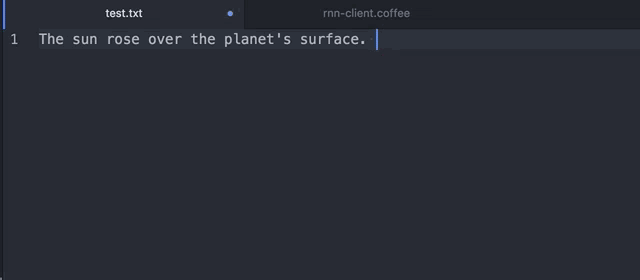Writing is a difficult job; though, as a primarily word-based site, we may be a little biased here at Hackaday. Not only does a writer have to know the basics, like what a semicolon is and when to use one, they also need to build sentences that convey information in a manner that is pleasant to read. As many commenters like to point out, even we struggle with this on occasion (lauded and scholarly as we are).
Wouldn’t it be better if we could let our computers do the heavy lifting for us? After all, a monkey with infinite time will eventually write Shakespeare and all that. Surely, a computer can be programmed to do all that fancy word assembly while we sit back and enjoy some coffee. Well, that’s what [Robin Sloan] set out to do with a recurrent neural network-powered writing assistant.
Alright, so it doesn’t actually write completely on its own. Instead, [Robin’s] software takes advantage of [JC Johnson’s] torch-rnn project, and integrates it into Atom to autocomplete sentences. [Robin] trained his neural network on hundreds of old issues of the sci-fi magazines Galaxy and IF Magazine, which are available at the Internet Archive. Once the server and corresponding Atom package are installed, a writer can simply push the Tab key and the sentence will be completed.
The results are interesting. [Robin] himself says “it’s like writing with a deranged but very well-read parrot on your shoulder.” While it’s not likely to be used as a serious writing tool anytime soon, the potential is certainly intriguing. When trained on relevant source material, the integration into software like Atom could be very useful. If a neural network can compose music, surely it can write some silly tech articles.
[thanks to Tim Trzepacz for the tip!]
Typewriter image: LjL (Public domain).


















https://www.youtube.com/watch?v=no_elVGGgW8
This is would be a good step up from the markov chain spam bots that exist to dump links on blogs for SEO.
SEO=BS for suckers selling something no one will want anyway,
Most search engine spiders ignore the bottom of website pages anyway (like real people do). Likewise, most will prioritize browser metric data that does not exhibit abnormal statistical distributions. Also, companies tend to manually verify/train their own result pages that also perma-ban cheats using China/India click armies.
People respond to social media Spam directly piped out of a chat bot, sponsored media click-bait stories, and free viral-campaigns.
Your entire private life is only worth about $14/yr on average.
Need better tools that start on the other end of the writing spectrum. The “we have an idea” part, and work down from there.
I am reminded of a game I saw on Facebook a while back.
It asked you to post the next 20 words that popped up in succession at the middle bottom (the word you typically started with and the next word was the mostly likely word to follow.
e.g. (typing the suggestions from my phone). I am sure that you have a Kwik Trip? I am not sure if I can get a chance to make sure you have to first realize that you are being presumptive about this!
Nice idea. How about using it for writing code? Train it with your current codebase, stackoverflow and other sources..
Use it for comments in the code, to mess with whoever decides to dive into the spaghetti.
heh, i like this application
Already exists -> https://www.codota.com/
What the hell is a Goatmaker?
A doe goat mated to a billy goat.
The essential weakness in these systems is that they don’t seem to have a multilevel sense of context, there is just the single context of the snippet, when the best output should be filtered using diminishing weights in proportion to the size of multiple contexts operating at different scales even up to the level of genre or topic.
Don’t need a writing assistant. I need an awesome editor. There’s a difference.
are some HAD writers already using this? (something something fidget spinner, something something STEAM, something something click-bait, something something divisive…)
I agree with Dennis M. Having this program be an editor for writers would be an amazing feat. Instead of having to wait hours for someone to edit what you’re writing, you can just paste in the program and receive feedback in minutes.
https://neuronets.net